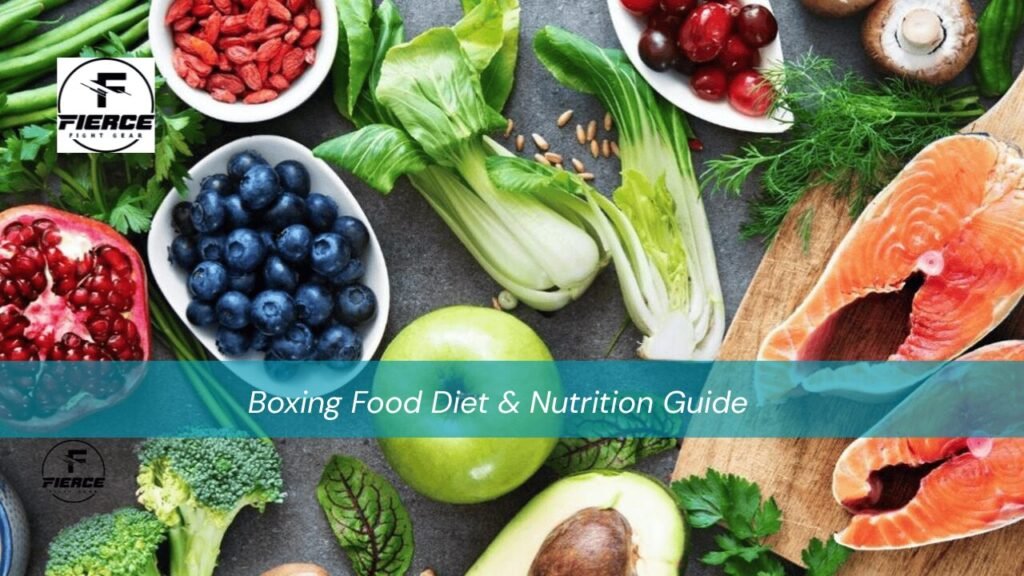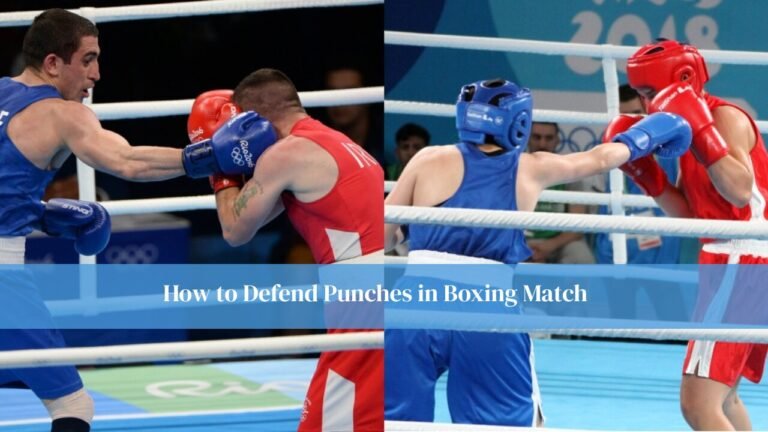Boxing is one of the most physically demanding sports in the world. It pushes the human body to its limits, requiring strength, endurance, speed, and mental sharpness all at once. To excel in the ring, a boxer must train relentlessly, but training alone is not enough. Without the right fuel, even the best fighters will find themselves slowing down, struggling to recover, or hitting a wall when it matters most. That’s why boxing food the nutritional choices a fighter makes before, during, and after training can be the difference between victory and defeat.
In this guide, we’ll break down everything boxers need to know about food and nutrition. From pre-training meals to post-fight recovery, safe weight cuts, and common diet mistakes, this article will provide practical advice backed by science and expert experience. Whether you are an amateur learning the ropes or a professional preparing for your next title bout, you will discover how to structure your diet to match the demands of one of the world’s toughest sports.
Key Takeaways
- Proper nutrition is critical for boxing performance, affecting energy, endurance, strength, and focus.
- Pre-training meals should be rich in carbs and moderate in protein, timed 2–3 hours before workouts.
- During and post-training, hydration, carbs, and protein are essential for energy maintenance and recovery.
- Smart weight management and avoiding common diet mistakes prevent fatigue, poor performance, and health risks.
Why Nutrition Matters in Boxing
Unlike sports that require steady exertion, boxing combines bursts of explosive movement with endurance across multiple rounds. Fighters need sharp reflexes, sustained energy, and muscular power. Without proper nutrition, fatigue sets in quickly, punches lose their snap, and concentration falters.
Nutrition affects almost every aspect of a boxer’s performance. Carbohydrates provide the fast-burning fuel needed for intense training and sparring. Protein supports muscle repair after tough workouts and helps maintain lean body mass. Healthy fats play a role in reducing inflammation and providing lasting energy, while hydration ensures that the brain and muscles can function efficiently under pressure.
Scientific research backs this up. The Sports Dietitians of Australia highlight that combat athletes benefit most when they strategically fuel their bodies before and after training sessions. Inadequate nutrition not only limits performance in the short term but also increases the risk of overtraining, illness, and long-term injuries. Simply put, boxing is not just about what happens in the gym or in the ring, it’s about how well a fighter supports their body outside of training.
What to Eat Before Boxing Training
Pre-training nutrition is about preparation. The right food before training provides the energy needed to perform at a high level without causing stomach discomfort. A boxer’s pre-workout meal should be rich in carbohydrates for quick energy and include a moderate amount of protein to support muscle maintenance.
For instance, oatmeal paired with banana and a drizzle of honey provides easily digestible carbs and a touch of natural sugar for a quick energy release. Whole-grain toast with peanut butter and sliced strawberries works just as well, combining carbs with a small dose of healthy fat and protein. Another option could be rice cakes topped with turkey breast, which is light yet effective at keeping hunger at bay during training. Smoothies made from oats, berries, and whey protein are also popular since they are easy to digest and can be consumed even if you are short on time.
Timing matters just as much as the type of food. Ideally, a boxer should eat two to three hours before training to allow digestion and avoid discomfort. However, if time is limited, a smaller snack such as a banana, a handful of dates, or an energy bar about 30–60 minutes before training can provide a quick boost. Skipping pre-training meals is one of the biggest mistakes fighters make, often leading to sluggish performance and difficulty maintaining intensity during sparring sessions.
The Best Foods During Boxing Training
Boxing training sessions can vary widely in length and intensity. A light technical session may not require mid-training snacks, but a grueling sparring session or a high-intensity conditioning workout that lasts more than 90 minutes may demand additional fuel.
In those cases, easily digestible carbohydrates are the best choice. Sports drinks that combine glucose and electrolytes can help maintain energy levels while also preventing dehydration. Natural options such as banana slices, medjool dates, or homemade energy gels can provide a quick sugar boost that is easy on the stomach.
Hydration during training is absolutely critical. Even mild dehydration reduces coordination, weakens punching power, and slows reaction times. Fighters should sip water consistently throughout their sessions rather than waiting until they feel thirsty. In hot conditions or during particularly intense workouts, adding an electrolyte supplement or coconut water can help replace sodium and potassium lost through sweat.
Recovery What to Eat After Boxing
Once training is over, the body immediately begins the recovery process. Muscles repair themselves, glycogen stores are replenished, and the immune system goes to work repairing the micro-damage caused by high-intensity exercise. To support this process, boxers should eat a balanced meal within 30–60 minutes after finishing their session.
Protein is essential for muscle repair. Lean sources such as chicken, eggs, fish, and plant-based proteins like lentils or tofu are excellent choices. Carbohydrates are equally important because they replenish glycogen stores, ensuring that energy levels are restored for the next workout. Healthy fats, while slower to digest, help reduce inflammation and support overall recovery.
A practical post-training meal could be grilled chicken with quinoa and roasted vegetables, providing a balance of protein, complex carbs, and micronutrients. Salmon with sweet potato and spinach offers anti-inflammatory omega-3 fats along with energy-restoring carbohydrates. Even a simple plate of eggs with whole-grain toast and avocado makes a great recovery meal. For fighters on the go, a protein shake blended with fruit and oats is a quick, effective option.
According to the Journal of the International Society of Sports Nutrition, consuming 20–30 grams of protein post-exercise significantly aids recovery, making this window of time one of the most important in a boxer’s daily routine.
A Boxer’s Diet Daily Nutrition Plan
Nutrition for boxers does not revolve only around training days. Consistency in everyday eating habits is what ensures sustained energy, better recovery, and optimal body composition. A boxer’s daily diet should focus on balancing carbohydrates, proteins, and fats while incorporating nutrient-rich foods that support long-term health.
Carbohydrates should make up about 45–55 percent of daily calories. Whole grains like brown rice, oats, and quinoa, along with fruits and starchy vegetables such as potatoes, provide the energy needed for training sessions and daily activity. Protein intake should fall in the range of 20–30 percent of total calories. This can come from lean meats, eggs, dairy products, or plant-based sources like beans and legumes. Healthy fats, making up around 20–25 percent of daily intake, play an important role in hormone balance and recovery. Avocado, olive oil, nuts, and fatty fish are among the best options.
Hydration is another pillar of daily nutrition. Boxers should aim to drink at least three to four liters of water daily, with more required during intense training phases. Relying only on thirst is not enough since dehydration can set in before noticeable symptoms occur.
A sample daily menu might begin with scrambled eggs and spinach alongside a bowl of oats topped with berries for breakfast. A mid-morning snack could be Greek yogurt with a handful of almonds. Lunch might feature brown rice, grilled chicken, and a colorful mix of vegetables. In the afternoon, hummus with carrots and pita bread provides a nutritious snack, while dinner could consist of baked salmon, sweet potato, and steamed broccoli. A light evening snack of cottage cheese with pineapple ensures the body continues repairing muscle tissue overnight.
Fight Week
Weight management is one of the most challenging aspects of boxing. Many fighters aim to compete at lower weight classes to maximize their size and strength advantage. However, unsafe weight cuts can backfire, leaving athletes drained, unfocused, and more vulnerable in the ring.
In the week leading up to a fight, boxers often reduce sodium intake gradually to prevent unnecessary water retention. Instead of processed or packaged foods, fighters rely on fresh, whole ingredients. Protein sources are often shifted to lighter options such as chicken, turkey, or fish to minimize digestive load. While some boxers drastically reduce carbohydrate intake, a smarter approach is to taper down while still maintaining enough energy from whole-food carbs like rice and oats.
Hydration strategies are equally important. Many fighters increase water intake early in the week and then taper down just before weigh-in to shed excess water weight. However, extreme dehydration methods such as sauna suits or excessive fluid restriction can impair performance and even pose health risks. The smartest fighters work closely with registered dietitians who specialize in combat sports to cut weight effectively without jeopardizing health or performance.
Real World Example
Floyd Mayweather Jr., one of boxing’s greatest champions, meticulously follows a diet tailored to his training and fight schedule. His nutrition plan includes lean proteins, complex carbs, and healthy fats, combined with precise hydration and meal timing. This approach allows him to maintain peak performance, recover quickly, and compete at the highest level consistently, exemplifying the real-world impact of proper boxing nutrition.
Common Mistakes in Boxing Nutrition
Even experienced fighters sometimes fall into bad nutritional habits that compromise performance. One of the most common mistakes is skipping meals before training, which can result in fatigue and lack of focus during sparring. Another error is overreliance on supplements. While protein powders and electrolyte mixes can be helpful, they should never replace real food.
Some fighters cut carbohydrates too drastically in an effort to stay lean, but this often backfires by reducing energy levels and slowing recovery. Others resort to extreme dehydration practices before weigh-ins, which not only hurt performance but also endanger long-term health. Another mistake is overeating immediately after a weigh-in, which can leave a fighter feeling bloated and sluggish during the actual fight.
Recognizing and avoiding these pitfalls is just as important as following the best practices of boxing nutrition.
FAQs
What foods should boxers avoid?
Boxers should limit processed snacks, fried foods, and sugary drinks. These options provide little nutritional value and can lead to sluggishness in training and fights.
Do boxers need supplements?
Supplements are not essential, but they can provide support in specific situations. Whey protein is a convenient way to increase protein intake, creatine can enhance strength and power, and electrolyte powders are useful during long or hot training sessions. However, supplements should never replace real food, and fighters should consult a nutritionist before adding anything new.
How much water should a boxer drink daily?
Hydration needs vary, but most fighters should consume at least three to four liters per day. The exact amount depends on factors like training intensity, sweat rate, and climate.
Can boxers eat carbs at night?
Yes, carbohydrates in the evening can help restore glycogen stores and improve overnight recovery, especially for fighters who train in the evening. The myth that carbs at night automatically lead to fat gain is not supported by science.
How do professional boxers manage their diet during fight camp?
Professional boxers usually work with sports dietitians who design meal plans tailored to their weight class, training schedule, and body composition goals. Meals are portioned carefully to ensure the fighter maintains strength while cutting fat where necessary.
Conclusion
Boxing is as much a battle of preparation as it is a battle in the ring. The best fighters understand that food is not just fuel it is a strategic tool that shapes performance, recovery, and long-term success. By paying attention to boxing food choices, fighters can gain the edge they need to train harder, recover faster, and fight smarter.
From balanced pre-workout meals to smart hydration strategies and safe weight cuts, nutrition is the hidden weapon of champions. Whether you are stepping into the ring for the first time or preparing for a world title fight, remember this: every punch you throw is powered by the food you eat.




